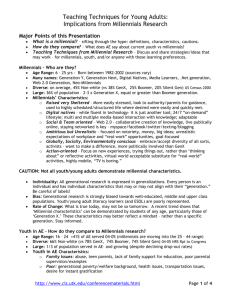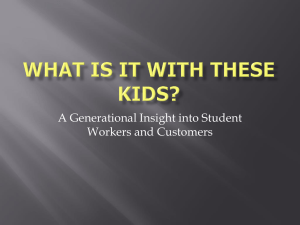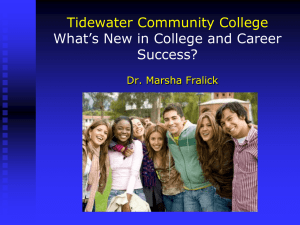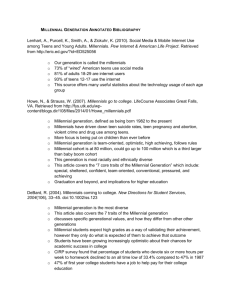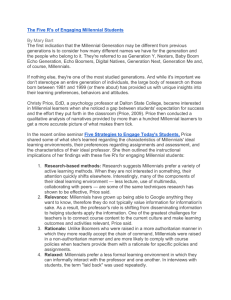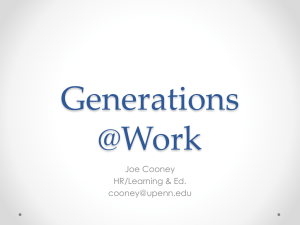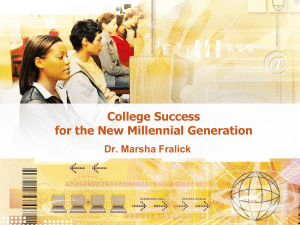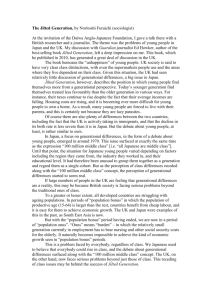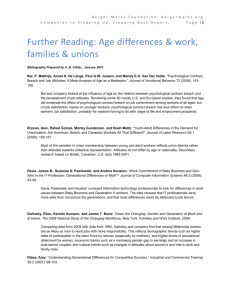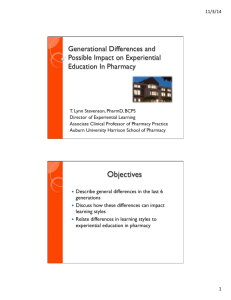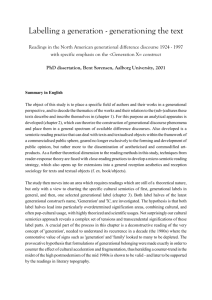The Millennials Have Arrived! Is Adult Education Ready?
advertisement
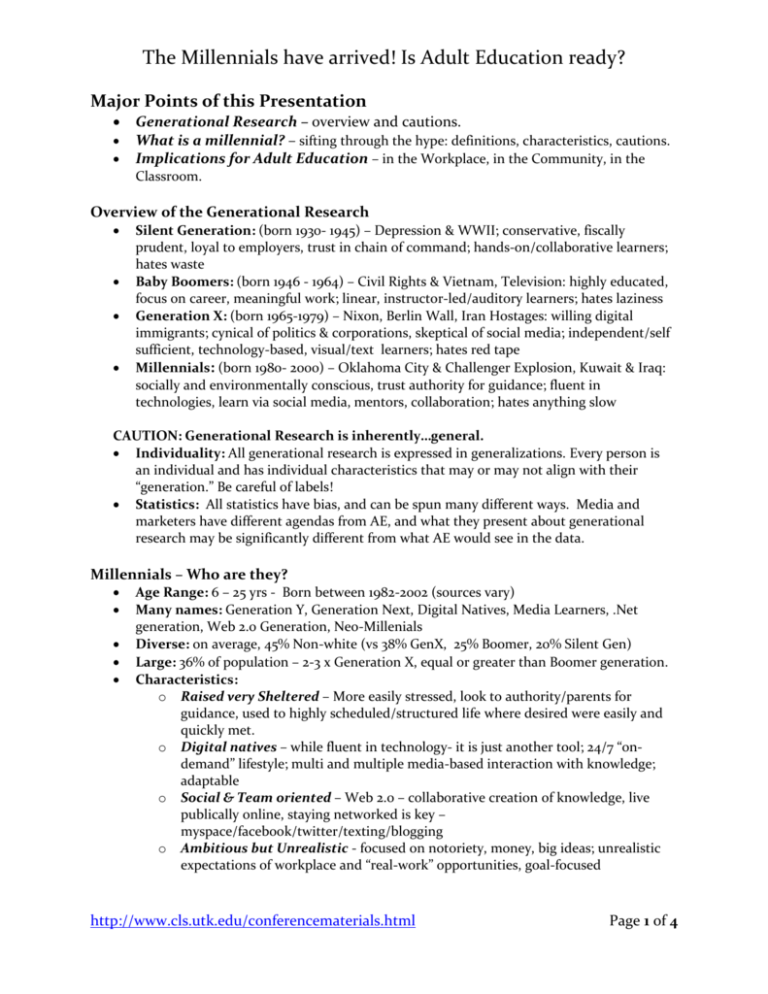
The Millennials have arrived! Is Adult Education ready? Major Points of this Presentation Generational Research – overview and cautions. What is a millennial? – sifting through the hype: definitions, characteristics, cautions. Implications for Adult Education – in the Workplace, in the Community, in the Classroom. Overview of the Generational Research Silent Generation: (born 1930- 1945) – Depression & WWII; conservative, fiscally prudent, loyal to employers, trust in chain of command; hands-on/collaborative learners; hates waste Baby Boomers: (born 1946 - 1964) – Civil Rights & Vietnam, Television: highly educated, focus on career, meaningful work; linear, instructor-led/auditory learners; hates laziness Generation X: (born 1965-1979) – Nixon, Berlin Wall, Iran Hostages: willing digital immigrants; cynical of politics & corporations, skeptical of social media; independent/self sufficient, technology-based, visual/text learners; hates red tape Millennials: (born 1980- 2000) – Oklahoma City & Challenger Explosion, Kuwait & Iraq: socially and environmentally conscious, trust authority for guidance; fluent in technologies, learn via social media, mentors, collaboration; hates anything slow CAUTION: Generational Research is inherently…general. Individuality: All generational research is expressed in generalizations. Every person is an individual and has individual characteristics that may or may not align with their “generation.” Be careful of labels! Statistics: All statistics have bias, and can be spun many different ways. Media and marketers have different agendas from AE, and what they present about generational research may be significantly different from what AE would see in the data. Millennials – Who are they? Age Range: 6 – 25 yrs - Born between 1982-2002 (sources vary) Many names: Generation Y, Generation Next, Digital Natives, Media Learners, .Net generation, Web 2.0 Generation, Neo-Millenials Diverse: on average, 45% Non-white (vs 38% GenX, 25% Boomer, 20% Silent Gen) Large: 36% of population – 2-3 x Generation X, equal or greater than Boomer generation. Characteristics: o Raised very Sheltered – More easily stressed, look to authority/parents for guidance, used to highly scheduled/structured life where desired were easily and quickly met. o Digital natives – while fluent in technology- it is just another tool; 24/7 “ondemand” lifestyle; multi and multiple media-based interaction with knowledge; adaptable o Social & Team oriented – Web 2.0 – collaborative creation of knowledge, live publically online, staying networked is key – myspace/facebook/twitter/texting/blogging o Ambitious but Unrealistic - focused on notoriety, money, big ideas; unrealistic expectations of workplace and “real-work” opportunities, goal-focused http://www.cls.utk.edu/conferencematerials.html Page 1 of 4 The Millennials have arrived! Is Adult Education ready? o o Globally, Socially, Environmentally conscious – embrace/accept diversity of all sorts, activists – want to make a difference, more politically involved than GenX Action-oriented – Focus on new experiences, trying things out, rather than ‘thinking about” or reflective activities, virtual world acceptable substitute for “real-world” activities, highly mobile, “TV is boring.” CAUTION: Not all youth/young adults demonstrate millennial characteristics. Bias: Generational research is strongly biased towards well-educated, middle and upper class populations. Youth/young adult literacy learners (and ESOL) are poorly represented in this research. Rate of Change: What is true today, may not be so tomorrow. A recent trend shows that ‘Millennial characteristics’ can be demonstrated by students of any age, particularly those of ‘Generation X.’ These characteristics may better reflect a mindset – rather than a specific generation. Stay informed. Implications for Adult Education (Topics for discussion) Workplace Recruitment & Retention of Employees – How to make AE jobs attractive, how to increase job satisfaction for younger employees, job loyalty issues? Orientation and initial Job Training – What skills will they bring? What will they lack? Inter-generational interactions – What to watch out for? What to work on as a staff? Professional Development issues – How will these employees want/be willing to learn? How might this affect budgets/logistics? What about Technology and these employees? Community Community Attitudes/Awareness – What do we need them to know/hear/understand? Volunteers – How do we appeal to, retain and train this generation? Fundraising/Support – Where are they? What can they do? What will appeal to them? Classroom How are Literacy Learners Different from “millenials? Marketing and Recruitment – How/where to reach them? How to appeal to them? How to cope with influx! Orientation & Assessment – What will they need? What don’t they need? Instruction o Multi-generational classes – Frictions? Benefits? o Youth-only classes – Benefits, barriers? Concerns? o Instructor-student interactions – Conflicting expectations/approaches? o Retention issues – What makes them stay? What drives them away? http://www.cls.utk.edu/conferencematerials.html Page 2 of 4 The Millennials have arrived! Is Adult Education ready? o o Learning preferences – What do instructors need to know? What training will they need? What resources/supports? Technology – What is the best USE of technology for these learners? Research Generational Research in Adult Literacy? ESOL issues? Proffessional development issues (multi-generational differences)? http://www.cls.utk.edu/conferencematerials.html Page 3 of 4 The Millennials have arrived! Is Adult Education ready? Our contact info: Duren – duren.thompson@utk.edu Bill – mcnutt@utk.edu 865-974-4109 Center for Literacy Studies, University of Tennessee 312 UT Conference Center Bldg Knoxville, TN 37996-4135 References & Resources Easy Reads: Coates, Julie (2007) Generation Y – The Millennial Generation, from Generational learning, LERN Books Excerpt at http://honolulu.hawaii.edu/intranet/committees/FacDevCom/guidebk/teachtip/GenY.ht m Interchange Group (2006) 7 Secrets to Working with Millennials http://www.interchangegroup.com/data/7%20Secrets%20to%20Working%20with%20Millennials.pdf Larrabee and Robinson (?) Ready or Not, Here They Come: Motivating and Retaining the Millennial Generation, Bell Oaks Executive Search http://www.belloaks.com/documents/Motivate,%20Retain%20Millennials_BellOaks.pdf Oblinger, Diana (2003) Boomers, Gen-Xers & Millennials: Understanding the New Students. http://net.educause.edu/ir/library/pdf/erm0342.pdf Pew Research Center for The People and The Press (2007) How Young People View Their Lives, Futures, and Politics: A Portrait of Generation Next http://people-press.org/report/300/a-portrait-of-generation-next Deeper Stuff: Dede, Chris (2005) Planning for Neomillennial Learning Styles. http://www.gse.harvard.edu/~dedech/DedeNeoMillennial.pdf Jekielek, Susan and Brown, Brett (2005) The Transition to Adulthood: Characteristics of Young Adults in America A Kids Count/PRB/Child Trends Report http://www.prb.org/pdf05/TransitionToAdulthood.pdf Lynch, Art (2009) Ready or Not: Adult Education and Millennial Generation http://open.salon.com/blog/alynch/2009/03/27/ready_or_not_adult_education_and_millennial_gene ration Oblinger and Oblinger (2005) Is it Age or IT: First steps toward understanding the Net Generation http://www.educause.edu/educatingthenetgen Stearley, Sean (2008) What Generational Diversity Means to e-Learning, Aetna. (Good overview of generations, and interesting research findings on media learning preferences.) http://iil08.wikispaces.com/file/view/What+Generational+Diversity+Means+to+e-Learning.ppt Wikipedia (2009) Web 2.0 http://en.wikipedia.org/wiki/Web_2.0 Woelfel, Stacey (2007) Cover Story: The Millennials http://www.rtnda.org/pages/media_items/cover-story-the-millennials582.php http://www.cls.utk.edu/conferencematerials.html Page 4 of 4

